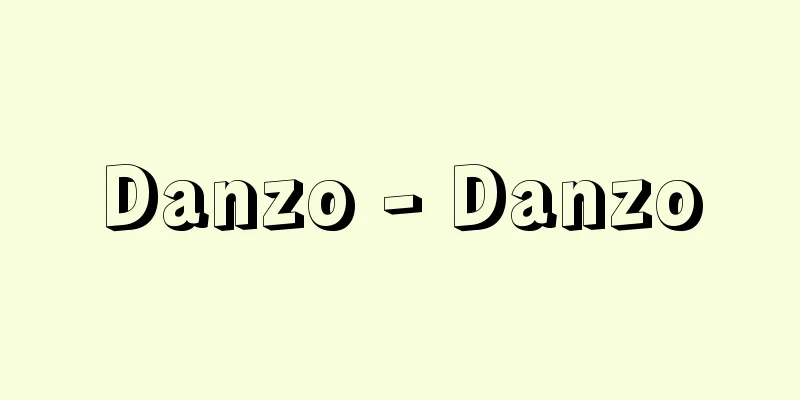Commonwealth of Nations
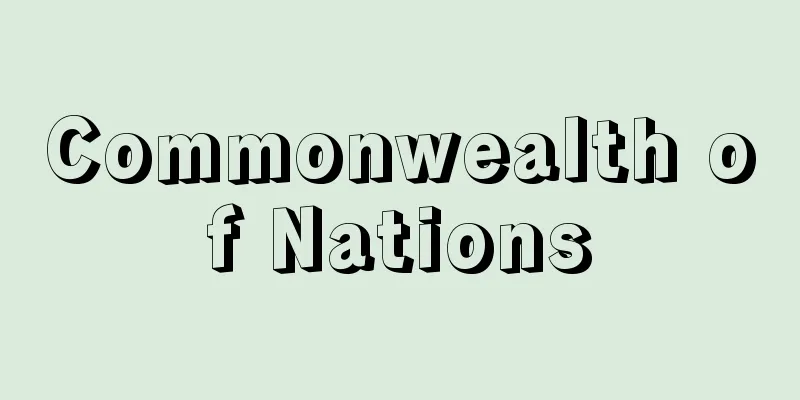
|
Commonly known as the Commonwealth, it is a group of 53 nations that gained independence from the UK and its former colonies. The other members are broadly classified as self-governing dominions such as Australia, New Zealand, and Canada, and countries in Asia, Africa, Oceania, and the Caribbean that gained independence after World War II. South Africa was also formerly a self-governing dominion, but in 1961 it changed its political form to a republic and left the Commonwealth, rejoining in 1994. Pakistan left in 1972 and rejoined in 1989. Cameroon and Mozambique were the most recent members in 1995. There are many small countries in Oceania and the Caribbean. The constituent members are sovereign nations that stand on an equal footing with the United Kingdom, and the collective name for these nations is the British Commonwealth. There is a special relationship between the member nations of the Commonwealth that is not found between ordinary independent nations. This is based on the historical reasons that these member nations were once British colonies. In Japan, it is usually called the British Commonwealth, but it is by no means a federation under international law. The correct name is the "Commonwealth of Nations," and it is abbreviated to "Commonwealth." [Ikeda Fumio] The nature of the CommonwealthThe Commonwealth is not a confederation, a personal union, or a federation under international law, but a unique multi-ethnic group of nations that cannot be understood by existing concepts. It is a group of nations that recognize the British territory as a symbol of mutual free association and the British King as the head of the Commonwealth. The association of these nations is extremely loose, a club-like bond based on friendly cooperation and practical benefits, so it is a kind of "multi-ethnic club" and "multi-racial household." There is only practical benefit and loose cooperation. Some countries have the British King as their head of state, but many have a separate king or president. The nations are not politically united, and rather non-political international cooperation forms the framework of the Commonwealth. Among them, economic aid and development investment play a major role. Newly independent nations join the Commonwealth because they benefit from it, and they leave if their interests conflict. However, since both were British colonies, they use English as their common language, which is said to be the bond that binds the Commonwealth. They also share British-style social systems and social customs, including a parliamentary system. [Ikeda Fumio] Establishment and Development of the CommonwealthAmong the member states, Canada, Australia, New Zealand, and others have been called dominions. The dominions were originally colonies of the UK, but they gained domestic autonomy before the outbreak of World War I, and after the war they also tended to become independent in their external relations. The Balfour Declaration of 1926 furthered this trend toward dominion independence, stating that the dominions were equal to the UK, bound by a common allegiance to the King, and freely associated with each other as members of the British Commonwealth. The Statute of Westminster of 1931 enshrined the spirit of the Balfour Declaration into law, legally establishing the independent status of the dominions. Thus, the First Commonwealth was established. There was a strong sense of solidarity among the dominions, with the British King as their common head of state. After World War II, with the independence of the former British colonies in Asia, Africa, Oceania and the Caribbean, the First Commonwealth, which was made up of self-governing white territories, changed into the Second Commonwealth, a multi-ethnic group of nations with different cultures. The high degree of internal homogeneity of the First Commonwealth was lost. In particular, after India changed its form of government to a republic in 1949 and refused to owe allegiance to the British King, it remained in the Commonwealth, so the idea of a common loyalty to the King could no longer be maintained. Therefore, at the Commonwealth Prime Ministers' Conference in 1949, the idea that "the British King is the symbol of the free association of the independent Commonwealth, and as such is the head of the Commonwealth" was formed. This was a dramatic transformation of the Commonwealth, and this Second Commonwealth is the current Commonwealth of Nations. [Ikeda Fumio] Commonwealth countries' special relationships(1) The British King is the symbol of the free association of the Commonwealth countries. (2) The British King has a special status as Head of State in the Commonwealth countries. The Head is not the Head of State, but merely a symbol of free association. (3) There is a Commonwealth Summit to discuss common problems. (4) They send High Commissioners instead of regular diplomatic missions. (5) They notify each other when they conclude treaties, and some Commonwealth countries do not refer their disputes to international judicial bodies, and extradition is also unusual. (6) The nationals of the Commonwealth countries have the status of Commonwealth citizens. [Ikeda Fumio] Britain's membership of the EC and the CommonwealthAfter the Second World War, the British economy began to decline, and the leading position of the UK among the member countries declined, and conflicts of interest among the member countries became more noticeable. When the UK joined the EC (now the EU, European Union) in 1973, the "Commonwealth Preferential Tariff," which was said to be the economic bond of the Commonwealth, was abolished. In order to survive, the UK chose to abandon the Commonwealth and become a member of the continental EC. With the EC membership, the British pound lost its position as the international key currency, and the pound area almost disappeared. These two facts accelerated the departure of the Commonwealth countries from the UK. But that does not mean that the Commonwealth will dissolve. Although the pound is no longer the key currency, the City of London is still the center of the world's financial market, including the Commonwealth, and the economic interests that the UK has in the Commonwealth countries are still large. For the poor countries that make up the Commonwealth, London is a reliable source. Where there is profit, there is unity. That is the Commonwealth. The Commonwealth's structures include a biennial summit, a secretariat, an aid fund and a technical fund. [Ikeda Fumio] "Ito Kei, 'A Study of the British Commonwealth's History' (1963, Hyogensha)" ▽ "Commonwealth Studies Association, ed., 'Studies on the British Commonwealth' (1969, International Telegraph and Telephone Company)" ▽ "Ikeda Fumio, 'The British Commonwealth and International Affairs' (1978, Kyoikusha, now Newton Press)" Source: Shogakukan Encyclopedia Nipponica About Encyclopedia Nipponica Information | Legend |
|
一般に英連邦とよばれる。イギリスと旧イギリス領植民地から独立した合計53か国で構成される国家グループ。イギリス以外の構成メンバーは、大別して自治領(ドミニオンDominion)とよばれたオーストラリア、ニュージーランド、カナダと、第二次世界大戦後に独立したアジア、アフリカ、オセアニアおよびカリブ海の諸国に分類される。南アフリカも以前には自治領の立場にあったが、1961年共和制に政体を変えイギリス連邦を離脱、1994年に復帰。パキスタンは1972年脱退、1989年に復帰。最近の加盟には、1995年のカメルーン、モザンビークがある。オセアニアとカリブ海の構成メンバーには小国が多い。 構成メンバーは、イギリスと対等な立場にある主権国家で、それらの集合体がイギリス連邦とよばれている。イギリス連邦の構成国の間には、普通の独立国家間にみられない特殊の関係がある。これは、これらの構成国が、かつてのイギリスの植民地であったという歴史的原因に基づいている。日本では普通、英連邦とよんでいるが、けっして国際法上の連邦ではない。正しい名称は「コモンウェルス・オブ・ネーションズ」であり、略して「コモンウェルス」である。 [池田文雄] コモンウェルスの性格コモンウェルスは国際法上の国家連合でも同君連合でも連邦でもなく、既成の概念ではとらえることのできない特殊な多民族の国家グループである。それはイギリス国土を相互の自由な結合の象徴として認め、かつイギリス国王をコモンウェルスの首長として認める諸国家のグループである。この諸国家の結合はきわめて緩く、友好協力関係と実利を基礎とするクラブ的な結び付きで、いわば「多民族クラブ」であり、「多人種の寄合い世帯」である。そこにあるのは実利による結合と緩やかな協力にすぎない。イギリス国王を元首とする国もあるが、別個の国王や大統領をもつ国も多い。各国は政治的にまとまることもなく、むしろ非政治的な国際協力がコモンウェルスの枠組みになっている。そのうちでも、経済援助と開発投資が大きな役割を果たしている。新独立国がコモンウェルスに加入するのは、そこに利益があるためで、利害が対立すれば離脱する。ただし、いずれもイギリス領植民地であったため、英語を共通語として使用し、英語が英連邦を結ぶきずなといわれるほか、議会制度をはじめイギリス流の社会制度ないし社会慣習という共通点をもつ。 [池田文雄] コモンウェルスの成立と発展構成国のなかで、カナダ、オーストラリア、ニュージーランドなどは、自治領(ドミニオン)とよばれてきた。自治領は、当初はイギリス本国の植民地であったが、第一次世界大戦の勃発(ぼっぱつ)前に内政上の自治を獲得し、戦後は対外関係においても独立する傾向を強めた。1926年のバルフォア宣言はこの自治領独立化の傾向を進め、自治領は本国と対等で、国王に対する共通の忠誠によって結ばれ、英コモンウェルスの一員として自由に結合するものとなった。1931年のウェストミンスター条例は、このバルフォア宣言の趣旨を法律化し、自治領の独立的地位を法的に確立した。ここに第一次コモンウェルスが成立した。そこにはイギリス国王を共通の元首とする濃い血族の連帯意識があった。第二次世界大戦後、アジア、アフリカ、オセアニア、カリブ海の旧イギリス領植民地の独立に伴い、白人の自治領で構成されていた第一次コモンウェルスは変質して、異文化をもつ多民族の国家グループである第二次コモンウェルスが成立した。そこでは第一次コモンウェルスがもっていた高度の内部的同質性は失われていった。ことに、インドが1949年政体を共和制に変え、イギリス国王に対する忠誠を拒否したのちも、コモンウェルス内に残ることとなったため、従来の国王に対する共通の忠誠という観念は維持できなくなった。そこで1949年のコモンウェルス首相会議で「イギリス国王は独立したコモンウェルスの自由な結合の象徴であり、かかるものとしてコモンウェルスの首長である」という観念が形成された。まさにコモンウェルスの劇的な変身であり、この第二次コモンウェルスが現在のイギリス連邦である。 [池田文雄] コモンウェルス諸国の特殊関係(1)イギリス国王はコモンウェルス諸国の自由な結合の象徴である。(2)イギリス国王はコモンウェルス諸国において、首長という特別の地位をもつ。首長は元首ではなく、自由な結合の象徴にすぎない。(3)共通の問題を協議するためにコモンウェルス首脳会議がある。(4)通常の外交使節のかわりに高等弁務官を派遣している。(5)条約を結ぶ際、相互に通報し、一部のコモンウェルス諸国間では、相互間の紛争は国際裁判機関に付託せず、犯罪人引渡しも普通と異なる。(6)コモンウェルス諸国の国民は、コモンウェルス市民という地位をもっている。 [池田文雄] イギリスのEC加盟とコモンウェルス第二次世界大戦後、イギリス経済の斜陽化に伴い、構成各国に対するイギリスの指導的地位が低下し、構成各国間の利害対立も目だってきた。1973年のイギリスのEC(現EU、ヨーロッパ連合)加盟により、コモンウェルスの経済的紐帯(ちゅうたい)といわれた「イギリス連邦特恵関税」が廃止された。イギリスは生き残るために、コモンウェルスを切り捨てて、大陸ECの一員となる道を選んだ。EC加盟に伴い、英ポンドは国際基軸通貨の座を降り、ポンド地域はほとんど消滅した。この二つの事実は、加速的にコモンウェルス諸国のイギリス離れをよんだ。ではコモンウェルスは解消してしまうかというとそうでもない。ポンドは基軸通貨ではなくなったが、ロンドンのシティは依然としてコモンウェルスを含む世界の金融市場の中心であり、イギリスがコモンウェルス諸国にもつ経済的権益はなお大きい。コモンウェルスを構成する貧しい諸国にとっては、頼りになるロンドンである。利益のあるところに結合がある。それがコモンウェルスである。 コモンウェルスの機構としては、2年に1回開催される首脳会議、事務局、援助基金、技術基金などがある。 [池田文雄] 『伊東敬著『英連邦史論』(1963・表現社)』▽『英連邦研究会編『英連邦の研究』(1969・国際電信電話株式会社)』▽『池田文雄著『英連邦と国際問題』(1978・教育社、現、ニュートンプレス)』 出典 小学館 日本大百科全書(ニッポニカ)日本大百科全書(ニッポニカ)について 情報 | 凡例 |
>>: British East Africa - British East Africa
Recommend
Epimedium - Epimedium
...It is also cultivated for ornamental purposes,...
Koivisto, M.
...Paasikivi (in office 1946-56) served two terms...
Weitzman
Zionist activist and chemist. Also known as Weizma...
Chlorops oryzae (English name)
...The body is yellow or yellowish brown, and man...
Offer - Offer
… In the first half of the 7th century, Cadwallon...
Hydridae
…the name is derived from the many-headed water s...
unica
...Therefore, the first characteristic of prints ...
Gencho - Gencho
Years of birth: unknown. A Buddhist sculptor who w...
Paper shop - Kamiya
〘 noun 〙① A place where paper is made. Also, the c...
Salicaceae
…Also, the Latin word for willow, vimen, also mea...
Water intake - water intake
…In recent years, underdrains have become an espe...
Platanthera
...A terrestrial orchid of the Orchidaceae family...
Holy Spirit - Seirei (English spelling)
The third person in the Christian trinity. It is ...
Gloucester (English spelling)
Gloucestershire is the capital of the county of Gl...
blow hole
...The use of chills is also effective. (2) Gas b...
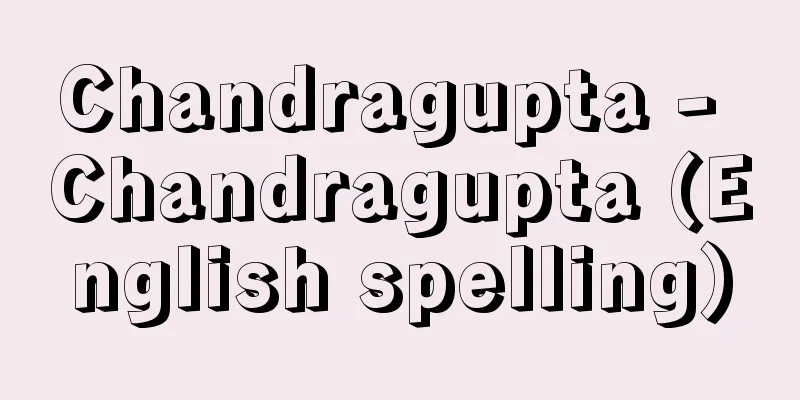
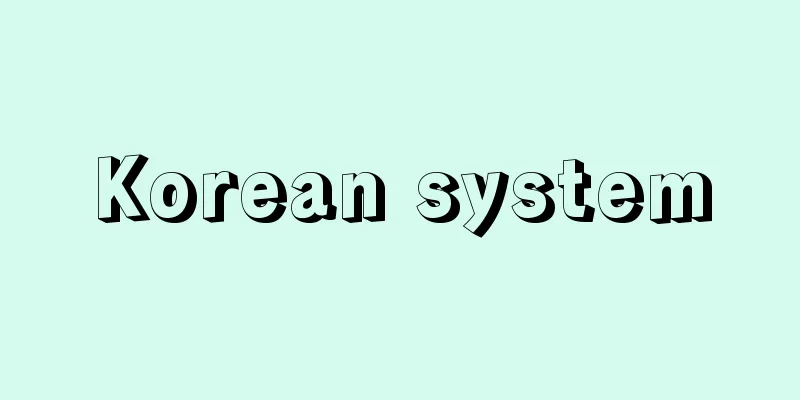
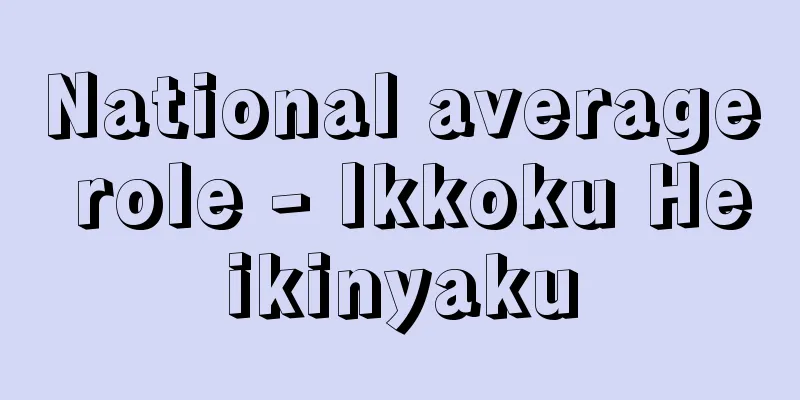




![Kanazu [town] - Kanazu](/upload/images/67cb3a741f807.webp)

